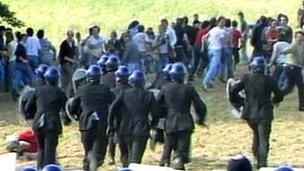Orgreave miners' strike handling referred to IPCC
- Published

The IPCC will consider whether an investigation into the force's handling over the Orgreave strike is necessary
A police force has referred its handling of incidents during a miners' strike in the 1980s to a watchdog.
It follows a BBC Inside Out programme that claimed South Yorkshire Police officers were told what to write in their statements, following clashes at Orgreave in 1984.
The Independent Police Complaints Commission will consider whether to investigate.
Chief Constable David Crompton said it was right the issue was addressed.
British Steel's coking plant at Orgreave was the scene for clashes between about 10,000 striking miners from pits across the county and 5,000 police officers.
A police report on 18 June states 93 pickets had been arrested. Fifty-one pickets and 72 police officers were injured.
Mr Crompton added: "We've taken time to examine some of the issues that were raised in the documentary and felt that it wasn't possible to say that we could clearly identify that there hadn't been anything that had gone wrong.
"In those circumstances we felt it was entirely right and open to have a conversation with the IPCC.
"None of this means given the passage of time that there is bound to be an investigation but it's right that the IPCC do what they are paid to do and look at that closely."
Evidence unreliable
Vera Baird, Solicitor General during the last Labour government, told the BBC police officers were asked by the force's detectives to describe in their statements "scenes they'd simply never seen".
A barrister at the time, Ms Baird first heard the claims during a trial at Sheffield Crown Court in 1985 while she was defending 15 of the 93 pickets arrested at Orgreave.
The trial collapsed after 16 weeks when it became clear police evidence was unreliable. One officer admitted much of his statement had been narrated to him.
Nottinghamshire MP John Mann, who previously called for an investigation, told the BBC: "It's important that this is properly looked at and we see what went on and why, so lessons can be learned.
"If people have broken the law, deliberately in order to fabricate evidence, then they should be arrested and they should be prosecuted."
The latest development comes after the Hillsborough Independent Panel revealed in September that 164 police statements had been altered after the disaster in April 1989 in which 96 Liverpool fans died.
About 116 of the statements were changed to remove or change negative comments about the policing of the FA Cup semi-final between Liverpool and Nottingham Forest at the Sheffield stadium.
- Published14 November 2012
- Published22 October 2012
- Published15 October 2012
- Published14 September 2012